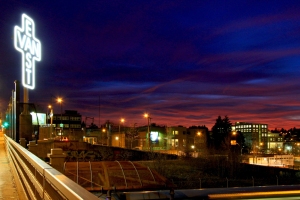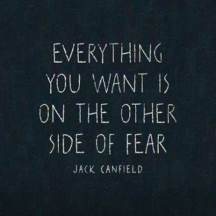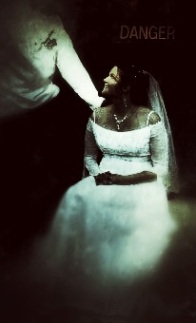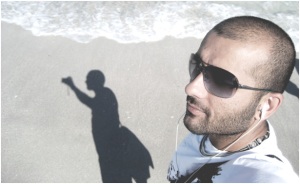“How do you explain to people that it is not true that you have a fiercely guarded heart? That it just feels like you have not had the space that felt safe enough to fully share it? To really let people in? And that you found that space with people who came into your life in a moment.”
~Catherin Hunter, Solo Polyamorist
 When’s the last time you had sex?
When’s the last time you had sex?
When’s the last time you had sex without fear? Had sex that was courageous?
I think of how often I have sought out sex in an effort to try and feel courageous, in moments when I have felt afraid. Having sex to fill a void in myself and seek out the intimacy and love that I didn’t experience in earlier life has been a band aid- one that has helped in short term healing, but that has hurt like hell when ripped off. Sex has been a remedy that’s intoxicating and addictive.
I’m used to fighting an internal battle during sex. It’s an effort to silence two voices of judgement. One tells me, “You’re being too much.” The other tells me, “You are not enough.” Both these voices come from a part of me that doesn’t feel like I have a ‘right’ to be who I am, that being solo, and polyamorous, and queer, somehow makes me ‘broken’ because I counter the expected norms. Over time I’ve learned how to navigate my focus away from those voices, but it takes some effort. And as my journey progresses, I have craved an experience of physical intimacy where those voices don’t hold any sway over me, and I can feel safe to celebrate who I am.
“Intimate relationship is perhaps the ashram of the 21st Century — a place especially ripe with transformational possibility, a combination crucible and sanctuary for the deepest sort of healing and awakening, through which the full integration of our physical, mental, emotional, psychological, and spiritual dimensions is more than possible.
Intimate relationship as a crucible and sanctuary for our healing and awakening — sounds good, doesn’t it? But once our honeymoon with this is over, the real labor begins. The path is not neatly laid out for us, in part because we, through our very relatedness with our intimate other, are co-creating that path, that relational unfolding, as we go, feeling our way — more often than not in far-from-straight lines — toward what really matters.
~ Robert Augustus Masters
This past weekend was the first International Solo Polyamory Conference. It was profound. It was transformational. It was healing. And I learned the incredible power of being honored, accepted, and celebrated for who I am, through honoring and celebrating people dancing the same path.
Singledom within a network of relations is, I believe, the new frontier for radical relating: it is predicted today that 1 in 4 adults will never marry and out of those that do, 50% will divorce. And it’s not that people are not wanting to have relationships anymore, they do! But within a social context that still prizes coupled monogamy above all else, we lack refined, accessible wisdom on how to actually do autonomous intimacy.
Solo Polyamory offers a ‘best of all worlds’ approach. Solo polyamory is honest non monogamy, without the relationship escalator. It is characterised by no primary partnerships, a focus on individual autonomy, and a prioritising of platonic support networks. It draws a diverse range of ages, ethnicities, genders, and orientations. We are something of a ‘fringe’ group within polyamory, overlapping a lot with Relationship Anarchy in our desire for sovereignty within relationships, and an aspiration for interdependence. In a world that seems to revolve around monogamous, dyadic coupledom, we eschew the idea that being a successful grown up means becoming a productive member of coupled-up consumer society.
To paraphrase Kim TallBear, we are people who are in recovery from monogamous colonization and upbringing.
This weekend was about making space, not just for ourselves, but for everyone who has felt disenchanted with the myths and obligations of monogamy.

“It’s about connecting THROUGH independence.”
~Kale Gossen
Coming and being out in the non-monogamy world is ‘easier’ when our relationships are good, but it’s harder to share when things are rocky. Solo polyamorists face shaming around false notions that we are incapable of commitment, afraid of intimacy, or closed off from meaningful connection. More than once, I have experienced someone else take the slightest imperfection in my relationship landscape and jump on that to say “Aha, see? your fault, you didn’t commit.” My honest sexuality has been painted as predatorial. My solo-ness been interpreted as a psychological fault. And I’m not the only one who has been stigmatised and ostracised because they don’t subscribe to relationship escalator expectations.
This is why we had a conference. To gather together a critical mass of solo polyamorists and see what could be generated in terms of affirming our relational choices and making our collective voices heard. This weekend was about being big, and making space.
I marvel at the diversity of experience that was present over the weekend. Unified in our desire for autonomy in the way we build relationships, and an aspiration for interdependence, we formed a very unique micro-community. It was delightful to connect in person with people I had gotten to know online, and people who were totally new to me, as well as deepening some existing connections with the local Solo Polyamory community.
The weekend was rich and wonderful. With unconference sessions on everything from Consent and Abuse, to “I can Unicorn if I Wanna!”, it was liberating to talk frankly about things too often stigmatised and silenced. I felt a letting go internally of the shame I’ve held around my not-so-great experiences in my journey as a solo polyamorist.
I had a very visceral experience of the power of creating a safe space for people to show up authentically. Getting to sit into being more a participant than organiser during most of Sunday, I feel an alchemy in action. I had tears rolling down my cheeks during Kim TallBear’s keynote on decolonising love; and the tears continued thru the day, with sharings raw and personal during breakout sessions, and feeling profoundly seen and supported in a web of kinship bound thru shared values and relatable experiences.
The closing circle was, for me, the most profound part of the weekend. In talking about our weekend highlights, one participant stood up to thank myself and co-producer Hannah Darvill for our organising, and the specific things said to me touched me in ways that I am wordless to express the full impact and significance of: that they were grateful for my peer-leadership, my role modelling of consent through the whole weekend, for the way I inspired and brought together so many while still sharing in raw and vulnerable ways. I cried again, in front of everyone. I’m still working on breathing into how deeply healing those words were.
 I won’t ever be able to talk publicly about some parts of my personal journey, and the challenges therein. Suffice to say that those specific things (servant leadership, consent culture, empowering individuals within community) reflect values core to who I am, but are also values which have been called into question in the past. To hear that positive reflection from someone I so greatly admire, and to see the resonance with others around the room- that’s a moment I’d like to dip into again and again and again.
I won’t ever be able to talk publicly about some parts of my personal journey, and the challenges therein. Suffice to say that those specific things (servant leadership, consent culture, empowering individuals within community) reflect values core to who I am, but are also values which have been called into question in the past. To hear that positive reflection from someone I so greatly admire, and to see the resonance with others around the room- that’s a moment I’d like to dip into again and again and again.
I started this article talking about sex.
SoloPolyCon was not about hooking up. It was about connections. And my weekend experience was punctuated by a connection rich with compelling chemistry. I’ve always found my connections with other solo polyamorists to move with less friction and more speed; maybe that’s got something to do with the shared value of autonomous intimacy. We speak the same language that dances between freedom and connection, and there’s a tremendous sense of ease for me in that.
Travis came up to me on the dance floor at our social mingler on the first evening and thanked me for something I’d said about us having a shared value of autonomy. My comment had been met with laughter and resonance, but he had found himself experiencing a strong emotional response to this. He said he’s been looking for his “people” for years, and when he saw everyone raising their hands for autonomy, he realised- here we were! We spent that first evening diving into deep conversation, which concluded with a kiss goodnight.
I loved our autonomous and flirtatious interactions over the weekend, sometimes just a glimpse of eye contact or smirk at one another during sessions we were both in. At other times, a full on staring contest and radical honesty in conversation. Delightful. Mischievous. Unapologetic. I liked this guy! After so many months of wrestling with PTSD and struggling with feeling connected to my sexual expression, I celebrated my healing journey with sex that was bold, kinky and fulfilling.
We had sex that was fearless. Where the voices that say “you’re not enough” and “you’re too much” were silent and I no longer had to do battle with or play prisoner to them. I didn’t have to force them into silence. They. Just. Weren’t. There.
After a steamy Saturday evening date we celebrated our autonomy once again: I headed out dancing, and he back to his airbnb.

My counselor reflected to me that it’s rare to find healing in similar circumstances to where our wounding happened. Having felt wounded in sexual intimacy, and then again wounded in poly community, I feel profoundly grateful that this weekend I experienced healing both in one on one intimacy, and within the greater polyamorous community. I felt loved and welcomed for every inch of who I am, and in no moment did I feel a need to justify or defend myself. It’s all still sinking in, and I suspect it will take a while for the immensity of what was created this weekend- for everyone, not only me- to fully land.
My cup is so full, my body vibrating, and my heart bursting.
Someone had remarked to me earlier that a lot of ‘movers and shakers’ turn up to conferences like these. In that closing circle we talked about the highlights of the conference, and the ‘what now?’. I was so moved to see dozens of people step into positions of community leadership in answer to an invitation to action. I have tingles up and down my spine thinking about this.
Alone, we’re solo and isolated, and can too often think we are powerless, or ‘broken’. Together Independently, we are a movement of social change and advocates for autonomy within intimacy. Though we are still detoxing from the monogamy hangover, we are, all of us, Superheroes- with the ability to inspire and celebrate one another in big, meaningful, profound ways.


 A big part of my journey in Solo Polyamory has been in seeking out that community and looking for ways to meet that need outside of an escalator relationship. The plural nature of polyamory lends itself well to this- at first glance, at least- with all the interconnected relations and interweaving of people. I, like many, have found myself at times falling into that old trope of “You’re poly, I’m poly, we have so much in common!” We don’t always choose the best family.
A big part of my journey in Solo Polyamory has been in seeking out that community and looking for ways to meet that need outside of an escalator relationship. The plural nature of polyamory lends itself well to this- at first glance, at least- with all the interconnected relations and interweaving of people. I, like many, have found myself at times falling into that old trope of “You’re poly, I’m poly, we have so much in common!” We don’t always choose the best family. This year so far has seen me diving into deep introspection around this. The cocooning winter hibernation has provided the perfect space for grounding into a deeper understanding of my self and what I need. I am someone who hasn’t experienced much security in my adult life, and many relationships- both romantic and social- have been ones that I’ve engaged in in part as a survival strategy, to build networks wherein I might find a safety net. And when I’ve found a dynamic that feels good, I’ve leaned in heavily, perhaps too much at times, in search of that security I crave.
This year so far has seen me diving into deep introspection around this. The cocooning winter hibernation has provided the perfect space for grounding into a deeper understanding of my self and what I need. I am someone who hasn’t experienced much security in my adult life, and many relationships- both romantic and social- have been ones that I’ve engaged in in part as a survival strategy, to build networks wherein I might find a safety net. And when I’ve found a dynamic that feels good, I’ve leaned in heavily, perhaps too much at times, in search of that security I crave. Signs this relationship dynamic might currently be Draining for me:
Signs this relationship dynamic might currently be Draining for me:













